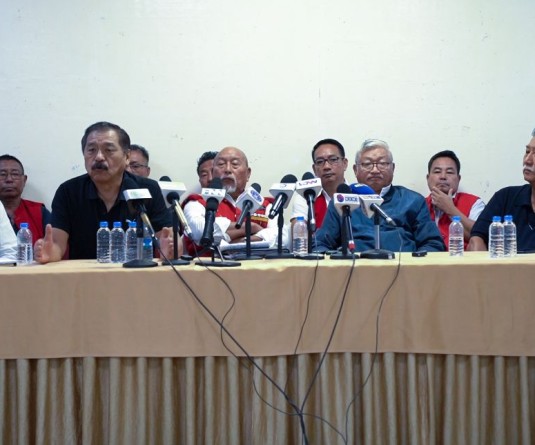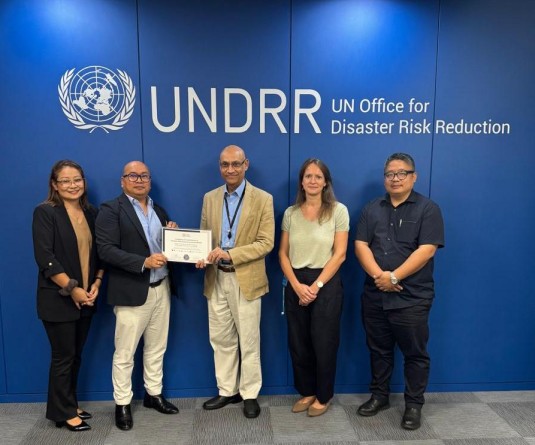
Dimapur, November 13 (MExN): Nagaland Director General of Police (DGP) Rupin Sharma has proposed a three-pronged operational strategy of ‘Coordination, Enforcement, and Accountability’ to combat the growing drug menace in the North-East, noting that drug trafficking has become both a “public health emergency” and a “national security threat.”
Delivering the keynote at the two-day Conference of Anti-Narcotics Task Forces (ANTF) for the Northeast, including Sikkim, at Chümoukedima, Sharma described the region, lying close to the Golden Triangle, as the “pivot of India’s fight against drugs.”
He highlighted that the porous 1,643 km Indo-Myanmar border, coupled with challenging terrain and governance turmoil in the neighbouring country, aggravates the crisis.
Sharma described the narcotics crisis as one that “silently exterminates a whole generation,” estimating that Nagaland alone has around 1.2 lakh drug users consuming nearly 10,000 kg annually.
Extrapolated across the Northeast, annual consumption could reach 1 lakh kg, with the rest of the country likely accounting for at least double that amount.
However, the entire region manages to seize only about 5,000 kg of heroin or brown sugar annually, a statistic Sharma termed “a classic story of failure.”
“Every kilo of heroin is not just a crime against the law but against the youth and the nation,” he underscored.
Challenges
The DGP highlighted four key challenges confronting drug enforcement in the region. He said the “narco-terrorism nexus finances insurgent groups through drug revenues at both individual and institutional levels.”
Socio-economic vulnerabilities, including unemployment and poverty, often push youth into drug trade networks, he said.
Institutional and coordination gaps, such as rivalry among agencies, limited forensic facilities, and insufficient canine support, further hinder operations, he added.
He also listed inadequate rehabilitation infrastructure and slow judicial processes which weaken both preventive measures and prosecutions.
Coordination, Enforcement & Accountability
To this end, Sharma outlined a three-pronged operational strategy centred on coordination, enforcement, and accountability. He noted that coordination remains the weakest link in the Northeast, as traffickers operate seamlessly across borders while law enforcement is constrained by jurisdictional limits.
To address this, he proposed joint interrogations via video conferencing within 24 hours of major arrests and the creation of shared digital databases containing biometric and financial profiles of suspects, financers, and mule networks accessible across all NE agencies.
He stressed moving from a “need-to-share” to a “duty-to-share” approach to intelligence and mandated uploading seizure and arrest data to the NIDAAN portal.
On enforcement, Sharma urged inter-state coordination through the Narco-Coordination Centre (NCORD) mechanism and emphasised targeted operations against financiers and kingpins rather than just couriers.
He highlighted tracking financial networks, including hawala routes, mule accounts, and suspicious bank transactions, and called for 24x7 interfaces with banks to facilitate law enforcement.
For synthetic drugs such as methamphetamine and “World is Yours (WY)” tablets, he proposed drone and satellite mapping to locate hidden laboratories and poppy cultivation zones along border belts.
Accountability, according to Sharma, must ensure anti-drug operations culminate in successful prosecutions. He identified weak documentation of conspiracies, delays in forensic reports, and a shortage of trained prosecutors as major gaps.
He proposed that every ANTF maintain secure databases of criminals, co-conspirators, vehicles, and undertrials accessible across agencies to aid investigations and prosecutions.
Sharma also highlighted the role of technology and community in combating drugs. The Nagaland Police is partnering with NIT Mizoram to develop an AI-based automated transcription system for lawful intercepts and voice calls, enhancing digital surveillance across multiple languages.
ANPR cameras along trafficking routes have been integrated with watchlists and facial recognition systems.
He underscored the importance of community engagement, urging collaboration with churches, NGOs, and traditional bodies for rehabilitation and harm reduction. “A recovered addict is a success for the community and a defeat for the cartel,” he remarked.
Policy Reforms and Interventions
At the policy level, Sharma proposed comprehensive reforms to make the anti-drug strategy more effective. He stressed the need for a thorough amendment to the NDPS Act, 1985, which has not undergone major structural reform since 2014.
Proposed reforms include introducing graded sentencing based on the individual’s role in the drug chain, recognising conspiracy to traffic as a distinct offence with deterrent punishment, and creating statutory provisions for plea bargaining in exchange for actionable intelligence on major networks.
Archaic provisions hindering modern investigations, including restrictions on electronic evidence, should be removed, and controlled delivery operations enabled for all agencies, he maintained.
Sharma also called for a Witness Protection Act, including the establishment of a Witness Protection Authority to provide physical and identity protection, financial support, and legal immunity to witnesses in NDPS cases involving commercial quantities.
He further recommended the creation of a dedicated Northeast Anti-Drug Trafficking Agency, led by a Director General-level officer with representation from all eight NE states.
This agency would serve as a regional nodal body for collecting and disseminating real-time intelligence, coordinating inter-state operations, managing border surveillance technology, and overseeing rehabilitation programmes, he added.
The DGP emphasised strengthening forensic infrastructure, noting the limited number of labs, long report backlogs, outdated equipment, and insufficient accreditation that weaken prosecutions.
He proposed establishing dedicated Narcotics Forensic Science Laboratories in each state, mobile labs for remote border areas, and technological upgrades including Gas Chromatography-Mass Spectrometry (GC-MS), Liquid Chromatography-Mass Spectrometry (LC-MS) for synthetic drugs, and DNA profiling.
To encourage public participation, he called for launching a “Nasha Mukt Bharat Helpline and Reward System,” providing a 24x7 toll-free number, anonymous multi-lingual reporting, and tiered rewards for information leading to arrests or seizures, including special incentives for intelligence on narco-terrorism links.
Finally, Sharma stressed the need to standardise preventive detention under the PITNDPS Act, calling for uniform procedures, timelines, and judicial interpretations across states.
He described the fight against narcotics as “a prolonged war fought on challenging frontiers” and reaffirmed Nagaland Police’s commitment to unconditional collaboration with the Union Home Ministry, the Narcotics Control Bureau (NCB), and sister agencies across the region.
“Let us commit today to raising our collective performance, targeting the big fish, and securing the future of the North East for a truly 'Drug-Free India,’” the DGP exhorted.





